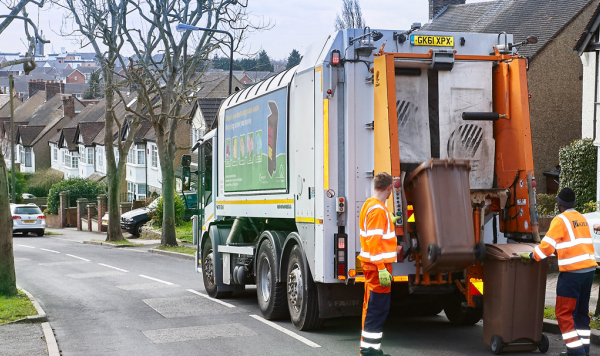Request
Dear Cheryl,
I would like to register Caroline Russell, London Assembly Member and Islington Councillor, to address the North London Waste Authority Meeting on Thursday 25 June, 2.30pm, under Item 6 - Deputations - on the Agenda.
The points she is intending to make are: Recycling rates - London has the highest incineration rate across the UK at 54 per cent. The Mayor of London’s Environment Strategy says London should be a zero-waste city. North London's recycling rate has actually decreased from 33 per cent to 30 per cent over last 5 years. Belvedere incinerator has negatively impacted recycling rates on the four councils in the Western Riverside Waste Authority, which have fallen by nearly 4 per cent from 2010 to 2016. Circular economy - Mayor's Environment Strategy and new London Plan both support the circular economy outcomes of reuse, repair, and remanufacture. The NLWA’s ‘Residual Waste Reduction Plan 2020-22’ objective is “To reduce local authority collected waste arisings in north London, promote resource efficiency and the circular economy, minimise climate impacts and improve the local environment.” Waste arisings - Help boroughs to reduce their arisings and cut the overall turnover of stuff. London Waste and Recycling Board (LWARB) report on the effect of applying circular economy initiatives to waste arisings across London results in a 30 per cent fall in overall London waste. NLWA boroughs show a decline in arisings since 2015/16. Coronavirus - This crisis has unforeseen economic consequences which puts the need for the incinerator into further doubt. Action to be taken - Pause, review and reassess need for the expansion of the incinerator.
Kind regards,
Response
Dear Councillor Russell,
I am writing to you regarding your deputation to the North London Waste Authority (NLWA) meeting on Thursday 25 June 2020. This was in relation to the North London Heat and Power Project (NLHPP).
I would like to thank you for joining the meeting and setting out the issues you wanted to draw to Members’ attention.
Following a thorough review of the proposed project, including the points raised in the deputations, I am letting you know that Members unanimously approved the start of procurement for the new Energy Recovery Facility (ERF). As promised in the meeting, we are responding in writing to each deputation. I have outlined the key points you raised and provided a response for each below, to advise you of Members’ understanding of these issues in making their decision.
n your deputation you referred to the impact on recycling rates as a result of waste incineration. We want to reassure you that the NLHPP is fully consistent with higher recycling rates and will not undermine the NLWA's efforts to increase recycling in the future. Energy recovery reduces the amount of waste sent to landfill, not the amount that is recycled. In the UK and across Europe, the most successful recyclers use energy recovery to treat non-recyclable waste and reduce landfill. In continental Europe this includes countries like Austria, Belgium and Germany. The same trend can be seen in the UK, with some of the local authorities with the best recycling rates using energy from waste – including South Oxfordshire and Stratford-Upon- Avon. NLWA does more than any London waste authority to help our residents increase their recycling rates and our waste prevention activities are one of the most significant in the UK. In fact, the cost to Councils and subsequently the taxpayer is lower for recycling than it is for residual waste, so the incentive to maximise recycling has financial benefits, as well as environmental. At the NLWA we recognise this, and that’s why as part of the NLHPP we are investing £100m in building new recycling facilities to help boost recycling rates to 50%. Whilst we are doing our upmost to encourage residents to increase their recycling rates, it also requires greater action from Government and producers, and we call on the Government for rapid and meaningful action.
In your deputation you made reference to the circular economy and highlighted NLWA’s ‘Residual Waste Reduction Plan 2020-22’ objective “To reduce local authority collected waste arisings in north London, promote resource efficiency and the circular economy, minimise climate impacts and improve the local environment”. The NLHPP is part of NLWA’s overall objective to promote resource efficiency and the circular economy. The NLWA’s dedicated team actively supports the circular economy through its award-winning programme of activity to reduce waste and increase recycling – the most extensive of any Waste Disposal Authority in London. In your deputation you referred to the level of waste arisings in north London with specific reference to NLWA boroughs showing a decline in arisings since 2015/16. The Greater London Authority (GLA) is clear that the NLHPP is required for London to manage its own non-recyclable waste in the future, and in doing so, the Project will prevent the landfilling of waste and its severe environmental consequences. Waste experts, including the GLA, predict that the amount of residual waste in north London, and across London, is expected to increase in the future. Individual households are expected to reduce their waste and recycle more. However, the projected housing growth in north London means there will be more households leading to an increase the overall volume of waste. In the same way, business growth will lead to a greater overall volume of waste, despite increasing recycling rates and reduction measures. NLWA’s waste modelling, which has been scrutinised by an independent planning inspector and examined population rises, employment, household income, as well as waste reduction and recycling in the future, further reaffirmed that the ERF needs capacity to treat up to 700,000 tonnes of north London’s non-recyclable waste each year by 2050. The NLWA is in regular dialogue with the GLA, which recently reaffirmed its support for the NLHPP on the basis that a) it will provide combined heat and power, and b) it will meet the Mayor’s carbon intensity – which is the Mayor’s standard on energy efficiency – now and in the future.
In your deputation you claimed that the economic impacts from the COVID-19 pandemic puts the NLHPP into doubt. The UK Government is clear that investment in infrastructure will be critical to stimulate the economic recovery. The NLHPP will provide direct public investment in vital infrastructure and provide at least 100 apprenticeships and 225 onsite skills training opportunities for school leavers and the unemployed. Our Project will also safeguard sustainable waste management services and support the local economy as it recovers from the COVID-19 impact.
If you have any further questions about the Project or require any clarifications, I would be happy to answer them or arrange a briefing at a suitable time.
Yours sincerely,
Cllr Clyde Loakes


